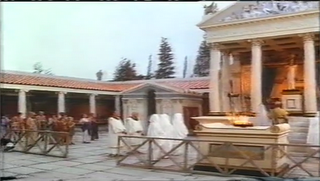In times of Christianity as an official, ie, by the Edict of Milan (313), was first called Hellenism to the latest manifestation of the pagan religion. A religion that had nothing to what had to be done based on the poems of Homer and basically had their inspiration in the divine oracle of the god Apollo. The late Hellenistic period, was a mixture of ancient beliefs of different origins and philosophy, especially Neoplatonism.
Neoplatonism
had a variety of sources, was the main thing, no doubt, Platonism, but
pitagoric. Even the drinking of stoicism and the Alexandrian Peripateticism.
And finally, the crowning of Neoplatonic theurgy philosophy, the more a
theology, the philosophy itself. We can therefore Neoplatonic theology, the
other by Plato, Aristotle and the Stoics, Posidonius of Apamea particularly
inspired, was also a collection of Orphic Rhapsodies calls that speak several
theogonies cosmologies and contained, and the Chaldeans Oráculas the famous
Egyptian Hermetic books . These were the books or theurgic magic of what was
considered a divine science.
All of
these elements, the body has a highly developed theology, known as the West is
not the chair has hypsitos of the idea of God first and only to the one of the
philosophers, who was in the popular religion, Zeus, Helios, or any other
supreme deity, Isis and Egyptian mystery cults, where the goddess was supreme
deity, and embodies the soul of the world as a whole. But theologians
Neoplatonists, the One who was a god above, of course, she has issued, he could
not because of his perfection and absolute immobility, a series of intelligible
gods, to build identified with the ideas of Plato. After these figures were
also worshiped divine wisdom, and then himself, who is called Cronus, ie
Saturn, the father of Zeus, who was identified with the Demiurge of Plato. And
after Zeus demiurge, were a series of calls Hipercósmicas or transcendent
deities, among whom the twelve gods power: a second Zeus, Hera, Poseidon,
Hades, Apollo, etc.. The gods Hipercósmicos, who worked in the demiurgic
activity, they were joined Encósmicos the gods, with the world. These gods had
a conservative raising activity, and purification of both individual souls, as
the cosmos itself followed the gods, angels with their archangels, demons (or
devils, are not necessarily the evil nature endowed them Christians), the
heroes and divine souls .
These
deities or spirits inhabit the cosmos invisible, and formed chains that had
some transcendent gods, that is, a transcendent God who started to understand
the source, such as the string demiurge, demiurge himself Intelligence (Zeus),
gods and Hipercósmicos in his creative activity, which were also helped by
angels, archangels and demons ... Thus, the various channels were divine.
Well,
Neoplatonism offered the option of "conversion" on the one hand by
the chains of the gods. This concept is of fundamental importance in
neo-Platonism, for the salvation of the proposal comes to this school, and the
philosophical basis of the various mysteries in which the world began. In the
mysteries of Mithras, a sun god Mithra was the god responsible for lifting and
cleaning of the conversion of their manure, and assumes the initiation, he did
it in seven different initiations in connection with the seven planetary
spheres. Was in the mysteries of the goddess Isis, this uplifting and
cleansing, which initiated its completely dedicated to her, accompanied
throughout the cosmos. In the ancient mysteries of Eleusis, Dionysus and the
goddess of hell (Persephone, Demeter or Hecate). Such were the mysteries of
Cybele and Attis, Adonis, etc.
In many
papyri from this period we have also mentioned gnostic deities, as UIS
Yaldabaoth, Abraxas, etc.. Gnosticism, instead of a strange sect of
Christianity heréretica was the normal way, the Egyptian Christianity
manifested, and references texts and fragments flood the Egyptians of this era.
And we also found some references to the religion of Moses, which often occurs
as a prophet to the height of Hermes Trismegistus and Zoroaster. The truth is
that, far from being exclusive, popular pagan religion of the Roman Empire, was
a set of beliefs like, with a strong philosophical base, all kinds of ritual
forms, rituals, liturgy, and above all accept magic.






No hay comentarios:
Publicar un comentario